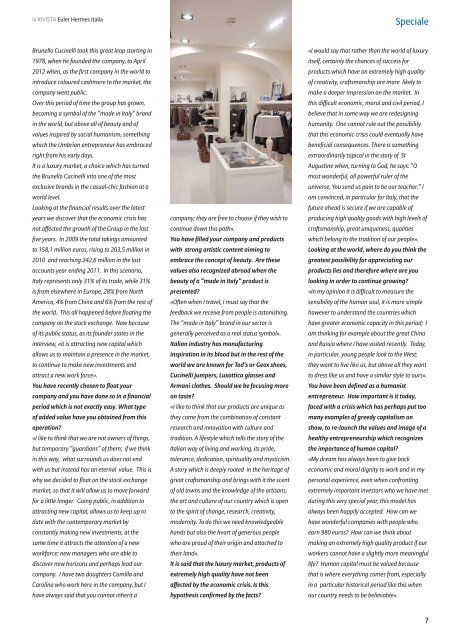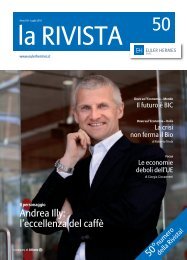La Rivista Euler Hermes Italia n°55
La Rivista Euler Hermes Italia n°55
La Rivista Euler Hermes Italia n°55
You also want an ePaper? Increase the reach of your titles
YUMPU automatically turns print PDFs into web optimized ePapers that Google loves.
la RIVISTA <strong>Euler</strong> <strong>Hermes</strong> <strong>Italia</strong><br />
Brunello Cucinelli took this great leap starting in<br />
1978, when he founded the company, to April<br />
2012 when, as the first company in the world to<br />
introduce coloured cashmere to the market, the<br />
company went public.<br />
Over this period of time the group has grown,<br />
becoming a symbol of the “made in Italy” brand<br />
in the world, but above all of beauty and of<br />
values inspired by social humanism, something<br />
which the Umbrian entrepreneur has embraced<br />
right from his early days.<br />
It is a luxury market, a choice which has turned<br />
the Brunello Cucinelli into one of the most<br />
exclusive brands in the casual-chic fashion at a<br />
world level.<br />
Looking at the financial results over the latest<br />
years we discover that the economic crisis has<br />
not affected the growth of the Group in the last<br />
five years. In 2009 the total takings amounted<br />
to 158,1 million euros, rising to 203,5 million in<br />
2010 and reaching 242,6 million in the last<br />
accounts year ending 2011. In this scenario,<br />
Italy represents only 31% of its trade, while 31%<br />
is from elsewhere in Europe, 28% from North<br />
America, 4% from China and 6% from the rest of<br />
the world. This all happened before floating the<br />
company on the stock exchange. Now because<br />
of its public status, as its founder states in the<br />
interview, «it is attracting new capital which<br />
allows us to maintain a presence in the market,<br />
to continue to make new investments and<br />
attract a new work force».<br />
You have recently chosen to float your<br />
company and you have done so in a financial<br />
period which is not exactly easy. What type<br />
of added value have you obtained from this<br />
operation?<br />
«I like to think that we are not owners of things,<br />
but temporary “guardians” of them; if we think<br />
in this way, what surrounds us does not end<br />
with us but instead has an eternal value. This is<br />
why we decided to float on the stock exchange<br />
market, so that it will allow us to move forward<br />
for a little longer. Going public, in addition to<br />
attracting new capital, allows us to keep up to<br />
date with the contemporary market by<br />
constantly making new investments, at the<br />
same time it attracts the attention of a new<br />
workforce: new managers who are able to<br />
discover new horizons and perhaps lead our<br />
company. I have two daughters Camilla and<br />
Carolina who work here in the company, but I<br />
have always said that you cannot inherit a<br />
company; they are free to choose if they wish to<br />
continue down this path».<br />
You have filled your company and products<br />
with strong artistic content aiming to<br />
embrace the concept of beauty. Are these<br />
values also recognized abroad when the<br />
beauty of a “made in Italy” product is<br />
presented?<br />
«Often when I travel, I must say that the<br />
feedback we receive from people is astonishing.<br />
The “made in Italy” brand in our sector is<br />
generally perceived as a real status symbol».<br />
<strong>Italia</strong>n industry has manufacturing<br />
inspiration in its blood but in the rest of the<br />
world we are known for Tod’s or Geox shoes,<br />
Cucinelli jumpers, Luxottica glasses and<br />
Armani clothes. Should we be focusing more<br />
on taste?<br />
«I like to think that our products are unique as<br />
they come from the combination of constant<br />
research and innovation with culture and<br />
tradition. A lifestyle which tells the story of the<br />
<strong>Italia</strong>n way of living and working, its pride,<br />
tolerance, dedication, spirituality and mysticism.<br />
A story which is deeply rooted in the heritage of<br />
great craftsmanship and brings with it the scent<br />
of old towns and the knowledge of the artisans,<br />
the art and culture of our country which is open<br />
to the spirit of change, research, creativity,<br />
modernity. To do this we need knowledgeable<br />
hands but also the heart of generous people<br />
who are proud of their origin and attached to<br />
their land».<br />
It is said that the luxury market, products of<br />
extremely high quality have not been<br />
affected by the economic crisis. Is this<br />
hypothesis confirmed by the facts?<br />
Speciale<br />
«I would say that rather than the world of luxury<br />
itself, certainly the chances of success for<br />
products which have an extremely high quality<br />
of creativity, craftsmanship are more likely to<br />
make a deeper impression on the market. In<br />
this difficult economic, moral and civil period, I<br />
believe that in some way we are redesigning<br />
humanity. One cannot rule out the possibility<br />
that this economic crisis could eventually have<br />
beneficial consequences. There is something<br />
extraordinarily topical in the story of St<br />
Augustine when, turning to God, he says: “O<br />
most wonderful, all powerful ruler of the<br />
universe, You send us pain to be our teacher.” I<br />
am convinced, in particular for Italy, that the<br />
future ahead is secure if we are capable of<br />
producing high quality goods with high levels of<br />
craftsmanship, great uniqueness, qualities<br />
which belong to the tradition of our people».<br />
Looking at the world, where do you think the<br />
greatest possibility for appreciating our<br />
products lies and therefore where are you<br />
looking in order to continue growing?<br />
«In my opinion it is difficult to measure the<br />
sensibility of the human soul, it is more simple<br />
however to understand the countries which<br />
have greater economic capacity in this period; I<br />
am thinking for example about the great China<br />
and Russia where I have visited recently. Today,<br />
in particular, young people look to the West:<br />
they want to live like us, but above all they want<br />
to dress like us and have a similar style to ours».<br />
You have been defined as a humanist<br />
entrepreneur. How important is it today,<br />
faced with a crisis which has perhaps put too<br />
many examples of greedy capitalism on<br />
show, to re-launch the values and image of a<br />
healthy entrepreneurship which recognizes<br />
the importance of human capital?<br />
«My dream has always been to give back<br />
economic and moral dignity to work and in my<br />
personal experience, even when confronting<br />
extremely important investors who we have met<br />
during this very special year, this model has<br />
always been happily accepted. How can we<br />
have wonderful companies with people who<br />
earn 980 euros? How can we think about<br />
making an extremely high quality product if our<br />
workers cannot have a slightly more meaningful<br />
life? Human capital must be valued because<br />
that is where everything comes from, especially<br />
in a particular historical period like this when<br />
our country needs to be believable».<br />
7




